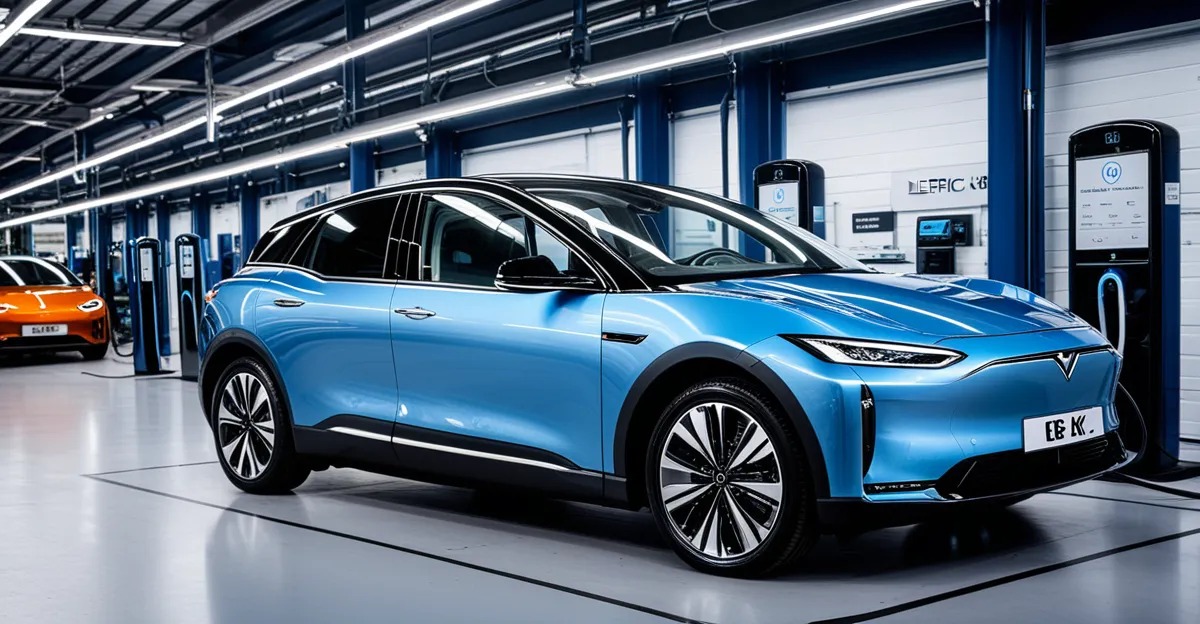Current Market Overview and Growth Projections
The UK electric vehicle market size is expanding rapidly, reflecting a significant shift toward cleaner transportation. As of recent market statistics, electric vehicles constitute roughly 14% of all new car sales in the UK, with annual EV registrations rising by nearly 40% year-on-year. This growth rate signifies increasing consumer acceptance and indicates a crucial turning point in the country’s automotive landscape.
In 2023, over 400,000 new electric vehicles were registered, a clear testament to the accelerating momentum behind electric mobility. Sales trends reveal a surge in the adoption of both battery electric vehicles (BEVs) and plug-in hybrids (PHEVs), driven largely by improved vehicle range, broader model availability, and enhanced affordability.
Also read : How is the UK Automotive Industry Addressing the Challenges of Sustainability?
Forecasts predict the UK EV market size will multiply several-fold by 2030, with some projections suggesting electric vehicles could represent over 60% of new car sales. This rapid growth is bolstered by evolving consumer preferences, government policies, and expanding infrastructure. Businesses and investors should closely monitor these market statistics to capitalize on emerging opportunities in the evolving automotive sector.
Government Policy Impact and Regulatory Opportunities
Government action is a major catalyst in the UK electric vehicle market size expansion. The UK government EV policy includes a comprehensive package of incentives designed to accelerate EV adoption. Key among these are grants reducing upfront costs for consumers, alongside substantial tax reliefs for EV manufacturers, making the switch more accessible and economically viable.
Also read : How Has Brexit Impacted the UK’s Automotive Industry?
Since the announcement of the 2030 ban on new petrol and diesel cars, regulatory drivers have gained significant momentum, pushing automakers to intensify their EV production efforts. This ban serves as a pivotal deadline aligning industry and consumer behavior toward electric vehicles, pushing the UK EV growth rate even higher.
In addition to fiscal incentives, the government promotes infrastructure investment and research and development support. These measures create a favourable environment for rapid sales growth, as reflected in recent market statistics showing record EV registrations.
Understanding these policies is essential for businesses and consumers aiming to benefit from the expanding market. The synergy between regulatory frameworks and financial incentives forms the backbone of the UK’s strategy to reach ambitious climate targets while expanding the EV ecosystem strategically. This focus on policy-driven growth underpins current and future developments in the electric vehicle sector.
Electric Vehicle Infrastructure Expansion
The EV charging infrastructure UK is rapidly evolving to match the surge in electric vehicle adoption. Public charging stations have grown significantly, with thousands now operational across urban and rural areas. This expansion addresses one of the primary barriers to EV ownership: range anxiety due to insufficient access to convenient charging points.
Investment in charging network development has increased substantially, with both government and private sectors funding new projects. This joint effort ensures that charging stations are not only expanding in number but also improving in technology, offering faster and more reliable charging solutions.
Efforts to enhance EV charging infrastructure UK include deploying high-capacity rapid chargers along major travel corridors and increasing the density of lower-speed chargers in residential and commercial locations. Addressing urban-rural disparities is a key focus, making EV use practical regardless of location.
Growth in public charging stations is complemented by incentives encouraging private installations in homes and workplaces. These initiatives create a robust and accessible charging ecosystem supporting the larger UK electric vehicle market size and sustained UK EV growth rate. The ongoing development of EV charging infrastructure UK will be pivotal in maintaining positive adoption trends and meeting future demand.
Consumer Trends and Market Demand Drivers
Understanding UK consumer EV adoption trends reveals why the UK EV growth rate continues to accelerate. Consumer attitudes have shifted remarkably, with a growing majority perceiving electric vehicles as practical and environmentally responsible choices. Surveys indicate that factors such as lower running costs, improved vehicle range, and increasing model variety strongly influence purchase decisions.
Key EV demand drivers include technological improvements making electric cars more competitive with traditional vehicles. Ease of charging and the expanding EV charging infrastructure UK further encourage consumers. Additionally, government incentives heighten affordability, directly impacting adoption rates.
Fleet electrification, particularly in commercial and public sectors, reflects another significant market trend. Businesses increasingly incorporate electric vehicles to reduce emissions and operational costs, supporting steady market expansion. For instance, logistics and delivery companies widely adopt EVs to meet sustainability goals.
In summary, consumer confidence combined with technological progress and financial incentives creates a robust foundation for continued growth. These elements interact dynamically, pushing the UK electric vehicle market size higher with each passing year. The alignment of consumer preferences and industry capabilities ensures the UK remains a leading market in EV adoption going forward.
Technological Innovations and Emerging Opportunities
Technological advancements are central to the expanding UK electric vehicle market size. Recent progress in EV battery technology UK focuses on increasing energy density and reducing costs, enabling longer driving ranges and more affordable electric cars. Such improvements directly boost the UK EV growth rate by addressing consumer concerns about range and price.
Vehicle-to-grid technology is also gaining traction as a promising innovation. This system allows EVs to feed electricity back into the grid during peak demand, improving energy management and creating new revenue streams for owners. Adoption of smart charging solutions enhances this synergy, optimizing charging times and reducing strain on the electricity grid.
The UK is positioning itself as a hub for electric vehicle innovation by investing in research and development. Collaboration between manufacturers, startups, and universities fosters breakthroughs in battery chemistry, lightweight materials, and autonomous driving systems. These efforts not only enrich the UK electric vehicle market size but also attract global investment.
In summary, technological innovation fuels both consumer appeal and industry capability, reinforcing the UK EV growth rate. Continued advancement in battery and vehicle-to-grid technologies will be critical in sustaining market momentum through 2030 and beyond.
Opportunities for Businesses, Investors, and Manufacturers
The expanding UK electric vehicle market size presents extensive EV business opportunities UK across manufacturing, investment, and services. With the UK EV growth rate steadily increasing, automotive manufacturers can capitalize on rising demand by ramping up production of electric and hybrid models. This growth also spills over into component suppliers specializing in batteries, power electronics, and lightweight materials.
Investors find promising prospects in the EV sector through funding startups focused on innovative technologies and expanding charging infrastructure projects. The push for rapid deployment of public and private charging stations enhances investment appeal due to growing usage and government support.
Manufacturing growth is bolstered by collaborations with research institutions and government initiatives, creating a fertile ecosystem for innovation and scale. Such partnerships accelerate development cycles, reduce costs, and foster technological breakthroughs, directly impacting market expansion.
Overall, businesses and investors positioned strategically within the UK electric vehicle market size stand to benefit from a marketplace driven by sustained demand and progressive regulatory frameworks. Embracing these opportunities supports long-term growth aligned with the UK’s transition to sustainable transport.





